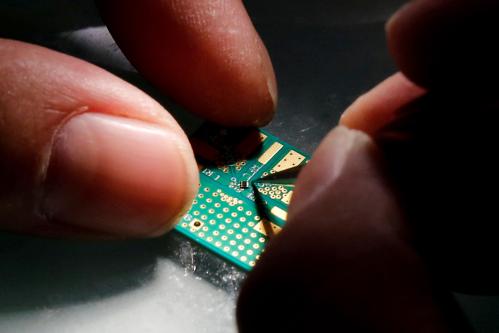Senator Charles Schumer, speaking at a Brookings Institution briefing on Wednesday, January 7, declared that “the fundamental model for free trade has changed,” but that “we don’t know what should replace it.”
Schumer spoke as part of a panel convened by Brookings to discuss how advances in technology, communications, and education have resulted in the transfer overseas of service sector jobs. This “offshoring,” according to Schumer, represents a stark departure from previous ideas of free trade, which applied only to the movement of goods, not “factors of production.” These changes are most apparent in countries such as China and India, which have large, educated workforces and low labor costs.
“If overseas countries can out-compete us,” said Schumer, “then maybe something is awry. We ought to reexamine our fundamental precepts that high-value added jobs will always be created here.”
Paul Craig Roberts, a senior research fellow at the Hoover Institution, agreed that the loss of these jobs undermined the principle of “comparative advantage.”
“If comparative advantage is the basis of free trade, how can it exist when the factors of production are as mobile as goods? The model breaks down under the current conditions we see in the world,” Roberts said.
Roberts noted that American white-collar workers will face increasing competition because skilled foreign workers can provide the same services and produce the same goods for far less pay.
Roberts and Senator Schumer co-authored an op-ed piece in Tuesday’s New York Times titled, “Second Thoughts on Free Trade.”
According to panelist Thomas J. Donohue, president and C.E.O. of the United States Chamber of Commerce, the situation poses a foreign policy dilemma because most of the countries absorbing American jobs share the democratic and capitalist values championed by the United States.
Donohue said that America’s legal, regulatory, and tax codes encourage companies to move abroad in hopes of increasing profits. He stopped short of recommending drastic changes, given the relatively new state of affairs and the political liberalization occurring in countries like China due to their trade relations with the United States, Britain, and other democracies.
“I’d rather stay here while we figure out what to do,” said Donohue, “instead of reacting to the Pavlovian suggestions in the political realm. Let’s ignore folks who want to throw the baby out with the wash water.”
Brookings Senior Fellow Lael Brainard called the movement of white-collar jobs “the next big thing in the great American globalization debate.” She said there was not yet enough information to properly examine its larger effects and called on government agencies to collect more and better data.
“In many ways, I would say it’s just a logical continuation of what we’ve seen in manufacturing and agriculture—there is a tendency to drive down costs,” said Brainard. “What feels different is that ‘services’ was traditionally the category of production that economists considered non-tradeable.”
Brainard presented some possible pitfalls of job outsourcing, including the lack of regulatory oversight in many foreign jurisdictions and the fact that consumers are not informed of where services are being handled.
Brainard drew a parallel with the labeling on consumer goods. “Should call center employees identify their locations? Should consumers know that their x-rays are being analyzed overseas?”
Schumer said that “something different is in the air and we ought to look at it and examine it.”
Brainard agreed and called on policymakers to “get ahead of this issue with thoughtful proposals, rather than playing catch up when the policy options are limited.”


Commentary
Op-edEvent Summary: Free Trade in the New Global Economy
January 7, 2004